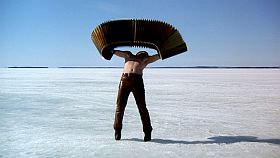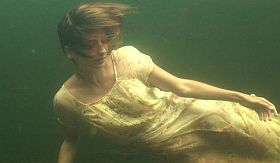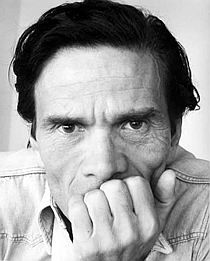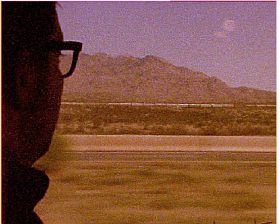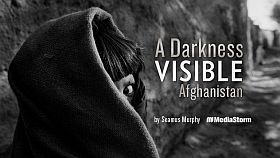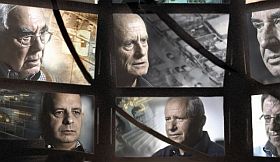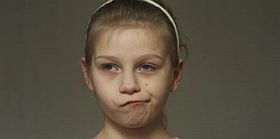Ada Bligaard Søby har i lidt mere end syv år været i gang med et konsekvent filmisk værk, som med undertitlen til den seneste af de syv film, det består af, også samlet kan kaldes a testament to the awesomeness of mankind. Det er store ord, men de siges på en stilfærdig måde. Der larmes ikke i hendes film, men hver rystende detalje, hvert udbrud af pludseligt vid præcist på plads i konstruktionerne, er fyldt med intens og sagte alvor: dette er mine ønsker for menneskets fremtid, og i et kaos af nutidig moralsk og materiel sammenbrud skimtes i filmene en forunderlig blid fasthed og en ærbødighed over for enhver kulturs integritet og historie. Alle filmene har, uden at Ada Bligaard Søby har rystet på hånden, i et og alt intenst levet op til de store ord. Der har været bygget og bygget på værket.
Sådan er det derfor selvfølgelig med den syvende og seneste film, Petey & Ginger(2012), som havde premiere på CPH:DOX i november og har været sendt for nylig på DR K. Den skal ikke først og fremmest nye veje, den skal videre med det, værket er i gang med. Så den vender tryg tilbage til den første film, American Losers (2006) i tema, den amerikanske kultur, og i kunstnerisk greb, en sammenstilling af en kvindes og en mands biografier og liv nu. I denne tilbagevenden, i denne sunde vedholdenhed fremstår den som en rig variation i en filmisk passacaglia.
Som i American Losers lægger Ada Bligaard kortene på bordet fra begyndelsen: jeg er ved at lave en film med mine venner, de er her: og vi får en scene med et samvær en aften. Instruktøren har samlet dem til en fest, et måltid i hvert fald, vi er formodentlig ved optagelsernes afslutning, de præsenterer sig for hinanden, de kender nemlig ikke hinanden, i hvert fald ikke alle, de er musikere i samme band, en del af dem, og så er der to, som er gift med hinanden, og der er fotografen Adam Nilsson og Ada Bligaard selv. Det er en hurtig, lidt genert og aldeles autentisk scene, sådan er det med det. Og herefter er filmen i gang, de to hovedpersoner skiller sig ud fra de andre medvirkende. Som i den første film: ”Ginger er min bedste ven, Petey er også min bedste ven”, kunne der have stået på speedmarker skilte. De to tager over og kommenterer deres samfund, deres tid og deres egne biografier, som de fortæller markante træk fra.

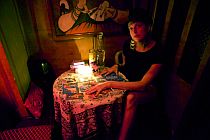
Det bliver til et helt andet end vanligt tidsbillede af årtierne omkring årtusindskiftet, Ada Bligaard tegner, en anden USA historie. Imperiets storhed er, ser det ud til, forbi, det er forfaldets kapitler, som nu skrives. Det vokser til en overvejelse af magthavernes, de økonomiske beslutningstageres dekadence, til en meditation over frådseriet og den flossede moral for øjnene af flere og flere fattige blandt menneskene, flere og flere, som lever sat på gaden åbenbart som følge af finansfolkenes dispositioner.
Men nogle af menneskene er rene af hjertet, og Petey og Ginger hører til den gruppe, på hver deres måde, som dog både er forskellige og ligner hinanden. Ada Bligaard kæmper som i andre film af sine film, ud over den nævnte American Losers og særlig fornemt i Meet me in Berlin (2007), en film om et muligt møde mellem hende og ham, så forskellige, men bevæget af den samme ømhed for hinanden i et mærkeligt fællesskab, hun arbejder energisk, men med dejlig let hånd på at holde balancen mellem de to personer, hun hver gang placerer på vippen. Og det bliver hver gang til klippekunstens vanskelige balancegang, på én gang holde fokus for iagttagelserne og balance i de ligevægtede karakterers udvikling. Netop det er Ada Bligaards særkende, et af dem. Det kan hun, det er en del af den cinematografiske musikalitet hun er begavet med.
En anden del af talentet er det hos hende selvfølgelige, men ganske særprægede billedsyn, som driver kameraet til optagelser, hvis stilfærdige skønhed berører dybt, ikke kun mig, men for eksempel også juryen, som gav hende prisen på CPH:DOX 2010. Den begrundede valget af De nøgne fra Skt. Petersborg (2010) med instruktørens ”særligt kreative udtryk og evne til vedholdende at være i stand til at imponere sit publikum med et stærkt visuelt udtryk”… “Scenerne er bundet sammen med et unikt blik og en meget personlig palet af farver, situationer, stemninger og følelser.” Det samme kunne siges om alle Ada Bligaards film og således også om Petey & Ginger. Ved sine egne optagelser, ved sine instruktioner til den kongenialt fotograferende Adam Nilsson og i høj grad også ved den overraskende dristige brug af arkivmateriale, ofte ganske privat og ofte af overfladisk set ret tvivlsom kvalitet, ser hun og aflokker det besynderlige æstetiske kvaliteter, der udgør billedmæssige territorier, som til nu var ukendte for i hvert fald mig. I sig selv en opdagelsesrejse.
En tredje del af Ada Bligaards kunstneriske særpræg er alvoren bag det hele og den ganske originale og naturlige evne, hun har til nå dybde i den filmiske tænkning. Petey & Ginger bliver og er således først og fremmest et personligt essay om moderne fattigdom på grundlag af en antropologisk undersøgelse, en poetisk og filmisk etnografi, som kommer tydeligt igennem. Efter at have set filmen sidder jeg helt stille, for det her er egentligt tankevækkende. Det er ikke en bekymring, dog, det ligner, men det er noget mere, det er en stille fortvivlelse. Ada Bligaard Søby ser det vist ikke selv sådan, jeg læser imidlertid filmen sådan, og så rigt er værket, det kan bag ryggen på sin autor forstås ud fra en lang række andre forudsætninger, og jeg er sikker på, der er svar til dem alle. Elementerne er for så vidt enkle og sædvanlige, men kvaliteten af dem er overraskende og overrumplende, ny og frigørende. Jeg har ikke set det tilsvarende i nogen anden af den nye bølge af berømmede danske dokumentarfilm. Dette er enestående i filmverdenens nu. Måske er Ada Bligaards arbejde især mærket af en munter uskyld på trods, på sin måde lig Peteys og Gingers liv.
Ada Bligaard Søby: Petey & Ginger, Danmark, 2012. 59 min. Manuskript: Ada Bligaard Søby, medvirkende: Ginger Partington og Petey Damnit, fotografi: Adam Nilsson og Ada Bligaard Søby, klip: Charlotte Munk Bengtsen, musik: The Oh Sees (og mange flere), lyddesign: Roar Skau Olsen, producer: Morten Kjems Juhl, Anna Byvald og Frank Mauceri, produktion og salg: Beofilm interfere@beofilm.dk www.beofilm.dk
http://peteygingerfilm.com/#Home




